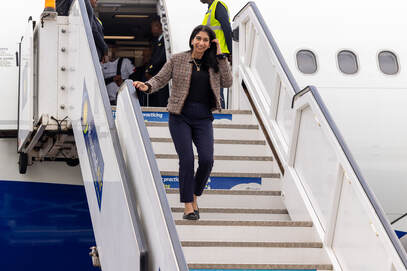
Suella Braverman’s sacking should of course be welcomed. She was an awful Home Secretary, who combined extreme cruelty with an obsessive determination to generate headlines rather than actual solutions to the UK’s beleaguered and creaking immigration and asylum system.
Whilst other recent occupants of this senior government post have pursued vicious anti-migrant agendas, none appeared to genuinely enjoy inflicting such misery and fear on vulnerable communities as Braverman. This was no better exemplified than her cackling with glee whilst visiting Rwanda in March, giddy at the thought of exiling vulnerable and scared people to a country many of them will have never even heard of. The removal of Braverman though will not even get close to fixing the damage caused during her tenure, and in the years preceding it. The government’s unhealthy fixation on immigration being the cause of all of the UK’s problems ensures that whilst the face may change and, hopefully, some of Braverman’s vicious language will cease, a shift in existing cruel and counter-productive policies is unlikely. Braverman was not hired by accident and her elevation to Home Secretary follows a pattern of more extreme figures receiving the position. She effectively succeeded Priti Patel, herself so viciously anti-migrant that she boasted that had she been in post at the time, her own parents would not have been allowed into the UK. Braverman was described as “Patel on steroids”, so her conduct whilst in post really was not a surprise. James Cleverly has now been confirmed as Braverman’s successor. Though we certainly hope he does not stoke hatred and division in the same way, judging by his video on X this afternoon – predictably stating that refugees arriving by boat, not an NHS on its knees or a cost-of-living crisis, are the biggest crisis facing the country – we should not expect any meaningful divergence. This is no clearer than with the government’s cash for humans Rwanda deal. The Supreme Court will be ruling on the lawfulness of this policy imminently, and if the government is serious about leaving the worst excesses of the Braverman era behind, they should start by scrapping the Rwanda deal. Whatever the Supreme Court decides, and even if they do find that in theory the scheme is legally permissible, it does not change the fact that it is morally reprehensible. From its announcement 19 months ago, the deal has struck fear into asylum seekers and shown the UK at its worst, far from the compassionate and kind country we profess to be. The creation of safe routes for refugees to reach the UK should swiftly follow. Braverman is not the only senior member of government who has repeatedly mischaracterised those taking dangerous journeys as “jumping the queue” when nothing could be further from the truth. The reality is that there is no queue to jump, with basically no options for people fleeing conflict to get to the UK. This April, Braverman shamelessly lied on Sky News that refugees should apply through the UNHCR, which as anyone working in the refugee sector will tell you is not how the process works. The UNHCR selects people for resettlement and then makes recommendations to the UK government. In the year ending March 2023, the UK resettled just 4,414 people, 16,000 fewer than the previous year. The government’s response to overseas conflicts, with the exception of Ukraine, has also been pitiful with no resettlement schemes introduced for those stranded in places such as Sudan. When the Sudanese conflict broke out in April, we were working on behalf of 14 people there hoping to reunite with close family in the UK. These were mainly unaccompanied children who were already refugees from neighbouring Eritrea. All 14 people were living in extremely dangerous conditions, yet all persisted with the labyrinth application process to come to the UK. To date, over 7 months later, only 2 have had their applications processed and managed to safely travel to the UK. In one of these cases, the government even claimed in court that the outbreak of conflict in Sudan was not a change of circumstance that meant the claim needed reconsidering. This lack of safe routes, and peoples’ desire to reunite with loved ones, is what drives dangerous journeys. Time and again we have heard from UK based family members how their relatives in Sudan cannot just sit tight and wait years for the government to consider their application. Faced with extreme danger, people are left with no option but to seek alternative and dangerous routes to safety. Rather than pursuing ever crueller and more punitive measures, the government should introduce schemes that allow those living in conflict zones to safely and swiftly travel to the UK when clear family ties exist here. Public support for the Ukrainian schemes suggests a far more welcoming approach than is often assumed, and, despite the government’s rhetoric, people actually want a welcoming, flexible, and fair migration system. The immigration system as it stands is none of these things, with no options for refugees to travel safely to the UK, people housed in disused army bases and abandoned barges whilst waiting years for a decision on their asylum claim and a government hell-bent on exiling people to Rwanda. Braverman’s removal alone does nothing to change this. If the government seriously wants to improve the UK’s immigration system, it could do so. Braverman’s departure may help tone down the rhetoric, but until sensible, serious and most importantly humane steps are taken to create safe routes and fix the delays inherent in the asylum decision-making process, nothing substantive will change. With public attitudes clearly shifting though, a fairer and kinder asylum system would be good politics and unquestionably save lives. |
Details
Archives
July 2024
Categories |

 RSS Feed
RSS Feed
